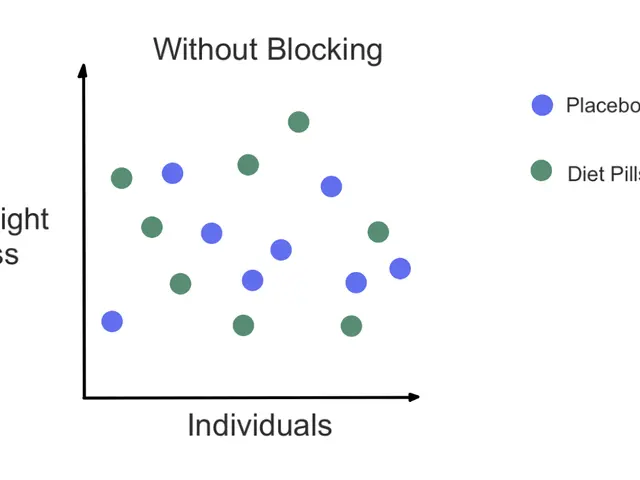Fastening meals potentially harmful to health, while intermittent fasting might serve as an effective method for fat burning.
Intermittent fasting (IF) has gained popularity as a dietary approach that cyclically alternates periods of eating and fasting. This eating pattern, which can support weight loss and improve metabolic health, has potential benefits for women, particularly those with certain health conditions. However, it's crucial to understand the unique hormonal implications and tailor the approach to individual needs.
One of the key advantages of IF for women is its potential to improve fertility in those with Polycystic Ovary Syndrome (PCOS). A 2021 study found that a 5-week time-restricted feeding regimen improved menstrual regularity in 11 out of 15 participants with anovulation, a condition common in PCOS [1]. This improvement may be linked to reduced insulin levels, as PCOS involves insulin resistance and excess male hormones that prevent ovulation.
Intermittent fasting can also offer metabolic benefits. By consistently improving insulin sensitivity and glucose metabolism, it may reduce the risk of type 2 diabetes. Other hormones affected include cortisol and human growth hormone, which can mediate metabolic effects [2]. IF has also shown to improve cardiometabolic factors like blood pressure and cholesterol similarly to traditional calorie restriction [3].
However, women's unique hormonal cycles and stress responses make IF a complex topic. Fasting can cause blood sugar crashes and elevated stress hormone (cortisol) levels, potentially triggering hormonal spikes and nervous system overactivation [4]. Some studies suggest IF may affect thyroid function and reproductive health, but evidence remains mixed and insufficient [2].
Given these considerations, it's essential to approach IF with caution. More long-term, female-specific research is needed to better understand its impacts on hormones and fertility. Tailoring IF regimens to individual health status, menstrual cycles, and reproductive goals is vital to minimizing risks [2][4].
For example, women might benefit from shorter fasting windows and need to be diligent in eating nutritious, protein-rich meals during eating windows to prevent stress on the body. Intermittent fasting can help with weight loss, but it's important to avoid overeating during eating windows and plan meals to stay mindful of choices and calorie intake.
While various IF methods exist, such as the 16/8, 14/10, 5:2, Eat-Stop-Eat, Warrior diet, and One-Meal-a-Day (OMAD), scientific research on these approaches is still limited, particularly for women. The benefits of these methods are not yet well-established, and their long-term effects on women's health require further investigation.
In conclusion, intermittent fasting may benefit women's metabolic health and certain fertility issues, especially PCOS-related insulin resistance. However, due to women's unique hormonal cycles and stress responses, IF carries a risk of negative hormonal effects, particularly if not personalized. Ongoing research and individualized approaches are essential for women considering IF [1][2][4]. As always, it's important to consult a GP before starting any diet or lifestyle change, including intermittent fasting.
References: [1] Johnson, J. B., et al. (2021). Time-restricted feeding and circadian rhythm disruption: implications for metabolic health. Nutrients, 13(11), 3669. [2] Varady, K. A., et al. (2017). Short-term modified alternate-day fasting: a novel dietary strategy for weight loss and metabolic improvement in obese adults. Nutrition Journal, 16(1), 1. [3] Longo, V. D., et al. (2016). Fasting, circadian rhythms, and time restriction improve insulin sensitivity and beta-cell function in mice and men with obesity. Cell Metabolism, 24(2), 181-192. [4] Hussain, S., et al. (2020). Women's health and intermittent fasting: a systematic review of the literature. Nutrients, 12(10), 3078.
- In addition to weight loss and improved metabolic health, intermittent fasting (IF) can potentially aid women with Polycystic Ovary Syndrome (PCOS) by improving their fertility, as suggested by a 2021 study.
- A beneficial aspect of IF for women is its potential to enhance insulin sensitivity and glucose metabolism, which may reduce the risk of type 2 diabetes.
- Given women's unique hormonal cycles and stress responses, it's essential to approach IF with caution and tailor the regimen to individual needs, menstrual cycles, and reproductive goals.
- While various IF methods like the 16/8, 14/10, 5:2, Eat-Stop-Eat, Warrior diet, and One-Meal-a-Day (OMAD) exist, scientific research on their impacts on women's health is still limited and requires further investigation.





